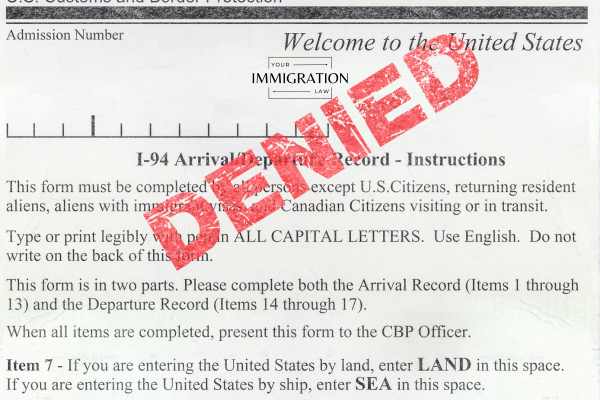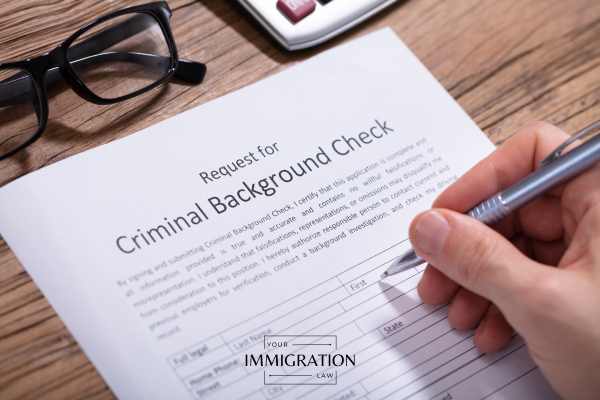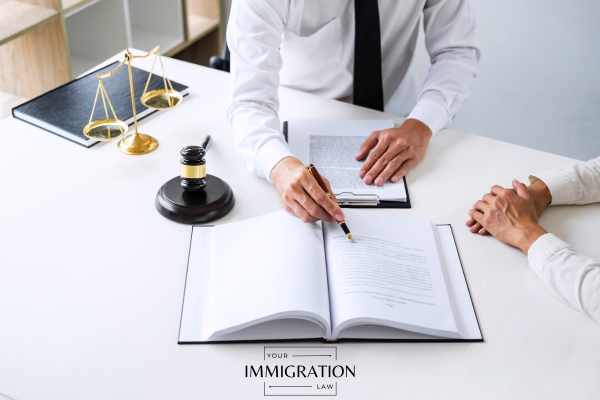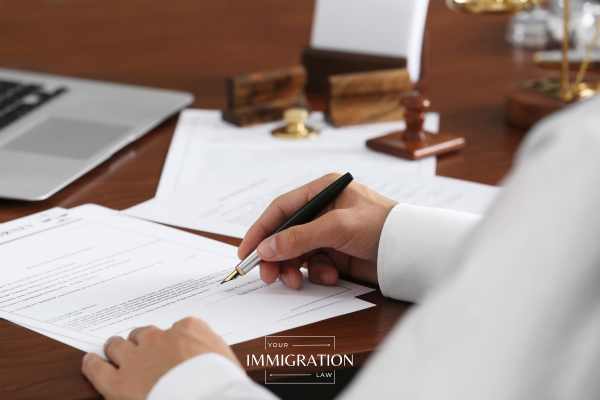Have you ever experienced the crushing disappointment of a visa denial? It's a setback that can shatter travel plans, disrupt career opportunities, and leave you feeling helpless. But don't lose hope just yet! There's a world of possibilities waiting for you, even after that dreaded rejection stamp.
Navigating the aftermath of a visa denial can be overwhelming, but it's not the end of the road. Whether you're a student eager to study abroad, a professional seeking international opportunities, or simply a globetrotter with wanderlust, there are several steps you can take to turn your visa woes around. From understanding the reason behind your denial to exploring alternative options, this guide will walk you through the essential actions to consider after facing a visa setback.
In the following sections, we'll delve into six crucial strategies that can help you bounce back from a visa denial. We'll explore how to decipher the rejection reasons, consider reapplication, investigate alternative visa options, and even appeal the decision. Plus, we'll discuss when it's time to seek professional assistance and how to plan for future travel success. Let's turn that visa denial into a mere bump on your journey to international adventures!
If your visa has been denied, don’t lose hope. Reach out to an experienced immigration attorney at 313-631-8080 to review your case.
Understand the Reason for Denial
When faced with a visa denial, the first and most crucial step is to thoroughly understand why your application was rejected. This knowledge forms the foundation for any future actions you might take, whether it's reapplying, exploring alternatives, or appealing the decision. Let's delve into the key aspects of understanding your visa denial.
Review the Denial Letter Carefully
The denial letter you receive from the embassy or consulate is your primary source of information regarding the reasons for your visa refusal. This document is critical, and it's essential to review it meticulously.
Key components of a visa denial letter:
- Reason for denial: The letter will cite specific sections of the Immigration and Nationality Act (INA) that apply to your case.
- Explanation: A brief description of why these sections apply to your situation.
- Potential remedies: Information on whether you can reapply or if the decision is final.
- Additional instructions: Any further steps you need to take or documents you need to provide.
When reviewing your denial letter, pay close attention to the following:
- Legal references: Note down the specific INA sections mentioned.
- Keywords: Identify any recurring terms or phrases that might indicate the main concerns.
- Timeframes: Look for any mentioned waiting periods before you can reapply.
- Suggested actions: The letter may provide guidance on what you can do to strengthen a future application.

It's crucial to approach this review process with a clear and objective mindset. While a visa denial can be emotionally challenging, try to separate your feelings from the facts presented in the letter. This will help you focus on the practical steps you can take moving forward.
| Common INA Sections | Meaning | Potential Solution |
|---|---|---|
| 214(b) | Inability to prove strong ties to home country | Provide more evidence of ties to your country of residence |
| 212(a)(4) | Public charge concerns | Demonstrate sufficient finances or a sponsor |
| 212(a)(9)(B) | Previous overstay | Wait out the mandatory bar period |
| 221(g) | Incomplete application or missing documents | Submit the required additional information |
Seek Clarification From the Embassy if Needed
Sometimes, the denial letter might not provide a clear or complete picture of why your visa was refused. In such cases, it's perfectly acceptable to seek further clarification from the embassy or consulate. Here's how you can go about this:
- Contact the embassy: Most embassies have dedicated phone lines or email addresses for visa-related inquiries. Use these official channels to request more information.
- Be specific: When reaching out, reference your case number and the specific parts of the denial letter you need clarification on.
- Be polite and professional: Remember, the consular officers are there to help. A respectful approach is more likely to yield positive results.
- Prepare your questions: Before contacting the embassy, write down your questions. This ensures you don't forget anything important during the conversation.
- Request a follow-up interview: In some cases, you might be able to schedule a follow-up interview with a consular officer for more detailed explanations.
It's important to note that while embassies can provide general clarification, they may not be able to give specific advice on how to overcome the denial in future applications. Their role is to explain the decision, not to guide you on circumventing it.
Sample questions to ask for clarification:
- "Could you please provide more details about the specific concerns regarding my ties to my home country?"
- "I'm unclear about the financial requirements for this visa. Could you elaborate on what evidence would be considered sufficient?"
- "The denial letter mentions 'inconsistencies' in my application. Could you specify which parts of my application raised these concerns?"
- "Is there any additional documentation I could provide to address the reasons for denial in a future application?"
Remember, the goal of seeking clarification is to gain a deeper understanding of the decision, not to argue or challenge it at this stage. Use this opportunity to gather information that will help you make informed decisions about your next steps.
Identify Specific Grounds for Rejection
Once you've carefully reviewed your denial letter and sought any necessary clarifications, the next step is to pinpoint the specific grounds for your visa rejection. This process involves analyzing the information you've gathered and identifying the key factors that led to the negative decision.
Common grounds for visa denial:
- Insufficient ties to home country: This is often cited under INA section 214(b) for nonimmigrant visas. The consular officer may have doubted your intention to return to your country of residence after your visit.
- Financial concerns: If the officer believes you may become a public charge (unable to support yourself financially during your stay), this could lead to a denial.
- Inadequate or inconsistent documentation: Missing, incomplete, or contradictory information in your application can result in a refusal.
- Ineligibility based on past actions: Previous immigration violations, criminal records, or security concerns can make an applicant ineligible.
- Failure to meet specific visa requirements: Each visa category has its own set of requirements that must be met.
To identify the specific grounds in your case:
- Cross-reference the denial letter: Match the INA sections mentioned in your letter with their corresponding reasons.
- Analyze your application: Review your submitted documents and interview responses. Try to identify any weak points or areas where you could have provided stronger evidence.
- Consider your visa type: Different visas have different requirements. Ensure you understand the specific criteria for the visa you applied for.
- Reflect on your interview: If you had a visa interview, think back to any questions that seemed to cause concern for the consular officer.
- Look for patterns: If you've applied before, compare this denial with any previous ones. Are there recurring issues?
Table: Common Denial Reasons and Potential Solutions
| Denial Reason | INA Section | Potential Solution |
|---|---|---|
| Insufficient ties to home country | 214(b) | Provide stronger evidence of employment, property ownership, or family responsibilities |
| Financial concerns | 212(a)(4) | Show more substantial savings, a sponsor, or proof of employment |
| Incomplete documentation | 221(g) | Submit all required documents, ensure consistency across all paperwork |
| Past immigration violations | 212(a)(9) | Wait out any bars to entry, provide evidence of changed circumstances |
| Criminal record | 212(a)(2) | Seek a waiver if eligible, provide evidence of rehabilitation |
Understanding the specific grounds for your visa denial is crucial for several reasons:
- It allows you to focus your efforts on addressing the exact issues that led to the denial.
- It helps you determine whether a quick reapplication is feasible or if you need more time to strengthen your case.
- It guides you in deciding whether to seek professional assistance, such as from an immigration appeal lawyer.
- It informs your strategy for future travel plans and visa applications.

Remember, a visa denial is not necessarily the end of your travel plans. By thoroughly understanding the reasons for the denial, you're taking the first step towards potentially overcoming these obstacles in the future.
As we move forward, it's important to consider how this understanding of your denial reasons can inform your next steps. Whether you decide to reapply, explore alternative visa options, or appeal the decision, this knowledge will be invaluable in shaping your strategy. In the next section, we'll explore the possibility of reapplication and what that process might entail based on the specific grounds of your denial.
Consider Reapplication
After facing a visa denial, one of the most viable options is to consider reapplying. While it may seem daunting, a well-planned and strategically timed reapplication can significantly increase your chances of success. In this section, we'll explore the key aspects of reapplying for a visa after a denial, including how to time your reapplication, strengthen your case, gather additional supporting documents, and address the issues that led to the initial denial.
Time Your Reapplication Strategically
Timing is crucial when it comes to reapplying for a visa after a denial. Rushing to submit a new application immediately after a refusal may not be the best approach. Instead, consider the following factors to determine the optimal time for reapplication:
- Waiting period: Some countries have specific waiting periods before you can reapply. For instance, the United States typically recommends waiting at least 60 days before submitting a new application. This allows sufficient time for your previous application to be fully processed and for any administrative issues to be resolved.
- Changes in circumstances: Assess if there have been any significant changes in your personal or professional situation that could strengthen your case. These changes might include:
- Securing a new job or promotion
- Acquiring additional qualifications or certifications
- Demonstrating stronger ties to your home country
- Improving your financial situation
- Addressing denial reasons: Take the time to fully understand and address the reasons for your initial denial. This may involve gathering additional documents, seeking legal advice, or making necessary changes to your application.
- Visa processing times: Research the current processing times for the type of visa you're applying for. Factor this into your reapplication timeline, especially if you have specific travel dates in mind.
- Seasonal considerations: Be aware of peak application periods, such as holiday seasons or academic year start dates, which may lead to longer processing times. Consider applying during less busy periods to potentially expedite the process.
| Timing Factor | Consideration |
|---|---|
| Waiting period | Typically 60 days or more |
| Changes in circumstances | Job, qualifications, ties to home country |
| Addressing denial reasons | Time to gather documents and make changes |
| Visa processing times | Research current timelines |
| Seasonal considerations | Avoid peak application periods |
By carefully considering these factors, you can choose the most opportune time to resubmit your visa application, increasing your chances of a favorable outcome.
Strengthen Your Case
When reapplying for a visa, it's crucial to present a stronger case than your initial application. This involves addressing any weaknesses in your previous application and highlighting positive changes in your circumstances. Here are some strategies to strengthen your case:
- Enhance your profile:
- Gain additional work experience or pursue further education
- Participate in professional development courses or obtain relevant certifications
- Engage in community service or volunteer activities to demonstrate good character
- Improve financial stability:
- Increase your savings or secure a higher-paying job
- Obtain sponsorship or financial guarantees from a reputable source
- Provide detailed documentation of your income, assets, and financial obligations
- Demonstrate stronger ties to your home country:
- Secure long-term employment contracts or start a business
- Invest in property or other significant assets in your home country
- Show family responsibilities or community involvement
- Clarify your travel purpose:
- Provide a more detailed and compelling reason for your visit
- Include specific itineraries, conference invitations, or business meeting schedules
- Obtain letters of support from relevant individuals or organizations in the destination country
- Address previous concerns:
- If your initial application raised concerns about your intention to return, provide additional evidence of your ties to your home country
- If there were questions about your financial capacity, provide more comprehensive financial documentation
- Improve your application presentation:
- Organize your documents in a clear and logical manner
- Provide translations for any documents not in English
- Include a cover letter summarizing the key points of your application and addressing any previous concerns
By focusing on these areas, you can significantly strengthen your case and present a more compelling visa application to the consular officer.
Explore Alternative Visa Options
Now that we've examined the reasons for visa denial and considered reapplication, let's delve into exploring alternative visa options. This step is crucial for visa applicants who may not be eligible for their initially chosen visa category or those seeking a different path to achieve their travel goals. By exploring alternative visa options, you can increase your chances of successfully entering your desired destination country.
Consult with Immigration Attorneys
When faced with a visa denial, seeking guidance from immigration experts can be invaluable. These professionals possess in-depth knowledge of various visa categories and can provide tailored advice based on your specific situation.
Benefits of consulting immigration experts:
- Personalized guidance: Immigration experts can assess your individual circumstances and recommend the most suitable visa options.
- Up-to-date information: They stay current with the latest changes in immigration laws and policies.
- Increased success rate: Their expertise can significantly improve your chances of obtaining a visa.
- Time and cost savings: By avoiding mistakes and choosing the right visa category, you can save time and money in the long run.

What to expect during a consultation:
- Assessment of your current situation and visa denial reasons
- Review of your eligibility for various visa categories
- Discussion of potential alternative visa options
- Explanation of the application process and requirements for each option
- Guidance on improving your chances of approval
Remember, while consulting with immigration experts can be highly beneficial, it's essential to choose a reputable professional to avoid falling victim to visa scams or receiving incorrect advice.
Check Eligibility for Other Visa Types
After consulting with immigration experts, the next step is to thoroughly check your eligibility for other visa types. This process involves researching various visa categories and assessing whether you meet the specific requirements for each.
Factors to consider when checking eligibility:
- Purpose of travel
- Duration of stay
- Educational background
- Work experience
- Financial status
- Family ties
- Country of residence
- Previous travel history
Common alternative visa types to explore:
| Visa Type | Purpose | Key Requirements |
|---|---|---|
| Student Visa | Study at an accredited institution | Acceptance letter, sufficient finances, language proficiency |
| Work Visa | Employment in the destination country | Job offer, relevant qualifications, sponsor |
| Tourist Visa | Short-term leisure travel | Proof of funds, return ticket, accommodation details |
| Business Visa | Attend meetings, conferences, or negotiations | Invitation letter, business itinerary, company sponsorship |
| Family Visa | Join family members residing in the destination country | Proof of relationship, sponsor's eligibility |
| Investor Visa | Invest in the destination country's economy | Minimum investment amount, business plan |
| Skilled Worker Visa | Fill labor shortages in specific industries | Qualifications, work experience, job offer |
| Working Holiday Visa | Combine travel with temporary work (age restrictions apply) | Age limit (usually 18-30), proof of funds |
It's important to note that eligibility criteria can vary significantly between countries and even between different visa categories within the same country. Therefore, a thorough and systematic approach to checking your eligibility is crucial.
Appeal the Decision
Now that we've explored alternative visa options, let's delve into the process of appealing a visa denial. While not all visa denials can be appealed, understanding the appeal process is crucial for those who believe their application was unfairly rejected.
Understand the Appeal Process
The appeal process for a visa denial can be complex and varies depending on the type of visa and the reason for denial. It's important to note that not all visa denials are eligible for appeal. Generally, nonimmigrant visas do not have a formal appeal process, but there are still options available.
Types of Appeals
- Motion to Reconsider: This is a request for the consular officer to review their decision based on the same information provided in the original application.
- Motion to Reopen: This involves presenting new evidence that was not available at the time of the original application.
- Waivers: In some cases, you may be eligible to apply for a waiver of ineligibility.
Eligibility for Appeal
The eligibility for appeal depends on several factors:
- Type of visa applied for
- Reason for denial
- Country of residence
- Specific circumstances of your case
It's crucial to carefully review your denial letter to understand if you're eligible for an appeal and what type of appeal process is available to you.
Meet Appeal Deadlines
Meeting deadlines is critical when appealing a visa denial. Missing a deadline could result in your appeal being rejected without consideration.

Typical Deadlines
| Type of Appeal | Typical Deadline |
|---|---|
| Motion to Reconsider | 30 days from denial |
| Motion to Reopen | 30 days from denial |
| Waivers | Varies by waiver type |
It's important to note that these deadlines can vary depending on the specific circumstances of your case and the policies of the embassy or consulate where you applied.
Tips for Meeting Deadlines
- Mark the deadline on your calendar immediately upon receiving the denial letter.
- Start gathering necessary documents and information as soon as possible.
- Allow extra time for unexpected delays or complications.
- If you're working with a legal representative, ensure they're aware of all deadlines.
Prepare a Compelling Appeal Letter
A well-crafted appeal letter is crucial to the success of your appeal. This letter should clearly and concisely explain why you believe the visa denial was incorrect or unjustified.
Key Elements of an Appeal Letter
- Introduction: Clearly state the purpose of your letter and reference your case number.
- Acknowledgment of Denial: Briefly summarize the reason given for your visa denial.
- Counter-Arguments: Address each point of denial with clear, factual information.
- New Information: If applicable, provide any new information that supports your case.
- Conclusion: Restate your request for reconsideration and thank the reader for their time.
Writing Tips
- Be respectful and professional in tone.
- Use clear, concise language.
- Avoid emotional appeals; focus on facts and evidence.
- Proofread carefully for grammar and spelling errors.
Gather Evidence to Support Your Appeal
Supporting your appeal with strong evidence is crucial. The type of evidence you need will depend on the reason for your visa denial.
Types of Evidence
- Financial Documents: If your visa was denied due to insufficient finances, gather:
- Bank statements
- Pay stubs
- Tax returns
- Proof of assets
- Ties to Home Country: If the consular officer doubted your intent to return home, provide:
- Employment contract or letter from your employer
- Property ownership documents
- Family ties documentation
- Educational Records: For student visas, include:
- Transcripts
- Diplomas
- Acceptance letters from educational institutions
- Travel History: If relevant, provide:
- Copies of previous visas
- Passport stamps showing compliance with visa terms
- Character References: Letters from respected community members can support your case.
Organizing Your Evidence
Create a clear, organized packet of evidence to support your appeal:
- Use a table of contents to list all documents.
- Number each page for easy reference.
- Include translations for any documents not in English.
- Provide clear explanations of how each piece of evidence supports your case.
Navigating Administrative Processing
In some cases, your visa application may be put into Administrative Processing, which is not a denial but a delay for further review. If your application is in this status:
- Be patient: Administrative Processing can take several weeks or even months.
- Check the status regularly: Use the embassy or consulate's online system to track your application.
- Respond promptly to any requests for additional information.
- Consider contacting your local congressional representative if the delay extends beyond the typical processing time.
Preparing for a Potential Visa Interview
In some cases, you may be called for another visa interview as part of the appeal process. To prepare:
- Review all documents submitted with your appeal.
- Practice answering potential questions about your case.
- Be prepared to explain any changes in your circumstances since the initial application.
- Remain calm and professional during the interview.

Maintaining a Positive Outlook
Dealing with a visa denial and going through the appeal process can be stressful and discouraging. Remember:
- Many successful visa applicants have faced initial denials.
- Use this experience as an opportunity to strengthen your application.
- Stay focused on your goals and the reasons for your travel plans.
- Seek support from family, friends, or professional counselors if needed.
Overcoming a Visa Denial
Facing a visa denial can be disheartening, but it's important to remember that it's not the end of the road. By understanding the reason for the denial, you can take appropriate steps to address the issue. Whether it's reapplying with stronger supporting documents, exploring alternative visa options, or appealing the decision, there are multiple paths forward.
Don't hesitate to seek professional assistance if you're unsure about the best course of action. Immigration lawyers and visa consultants can provide valuable insights and guidance. Ultimately, use this experience as an opportunity to strengthen your application for future travel plans. With persistence and the right approach, you can overcome this setback and achieve your travel goals.